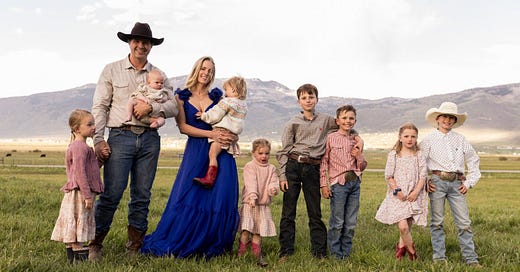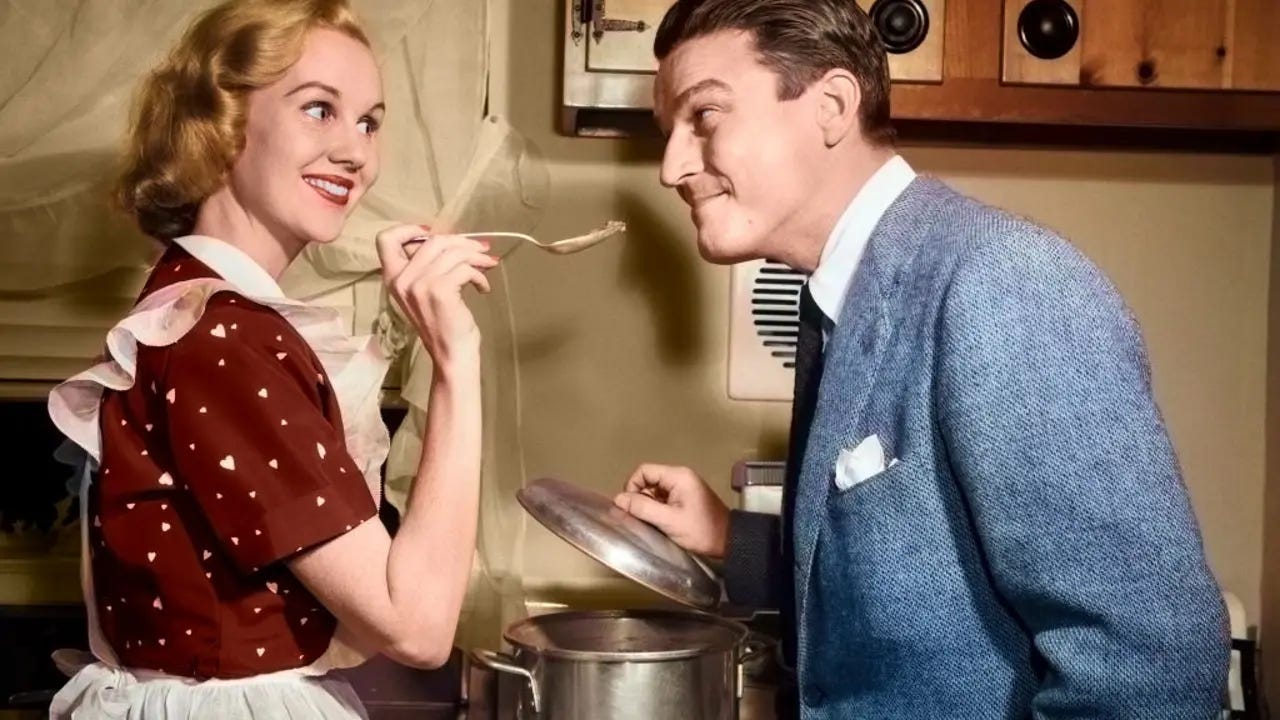At its core, I’ve always believed feminism is about choice. Want to be a neurosurgeon, florist or personal trainer? Go for it. Prefer to pass on getting married and having kids altogether? Amazing! Want to stay home and raise your children? Totally valid.
The point is, the choice should be yours—and yours alone.
But… I have recently been introduced to the Trad Wife movement and it’s left me with a distinct feeling of…ick.
My first foray into this lifestyle was through the Ballerina Farm Tik Tok account run by Hannah Neeleman, an ex-Juilliard trained dancer who traded the spotlight for a different kind of behind-the-scenes stage–a working farm in Utah. Along with her husband Daniel, she's built a thriving meat shipping and upscale flour company, while embracing what's known as the 'trad wife' (traditional wife) lifestyle. This movement celebrates traditional gender roles where wives focus on homemaking: preparing meals from scratch, homeschooling children, and taking primary responsibility for nurturing the family while their husbands serve as providers and protectors.
I was… morbidly fascinated.
Hannah's story has sparked some pretty intense debate. As a Mormon, her choices align with her religious values, but her viewers are divided. Critics worry about the implications of her trading a promising ballet career for a very intense domestic life, while supporters defend her right to choose this path.
Her story raises an interesting question: in an era where women have fought hard for workplace equality, what draws some to deliberately embrace traditional domestic roles?
(That sounded a little Carrie-Sex and the City. Without the sexy.)
The TikTok hashtag #TradWife has garnered well over 111 million views, as younger women post in support or in jest at the seemingly antiquated, fringe lifestyle.
In recent years, a growing number of younger women have embraced the role of the "tradwife," choosing to prioritize homemaking and traditional gender roles. While proponents argue that this lifestyle is a personal choice and a return to simpler times, critics raise concerns about the implications of romanticizing these very traditional (imposed?) gender roles.
Historically, such roles were not just societal expectations, but were often enforced by law. In 18th and early 19th-century Anglo-America, the legal doctrine of coverture dictated that married women had no separate legal identity from their husbands. Under coverture, women could not own property, enter into contracts, or earn wages in their own right; everything belonged to their husbands. This legal framework effectively rendered women dependent and subordinate, limiting their autonomy and opportunities.
The resurgence of the tradwife movement raises questions about why it’s so appealing. Some suggest that economic uncertainties and shifting gender dynamics have led women to seek comfort in traditional roles. The portrayal of tradwife lifestyles on social media, often through aesthetically pleasing and heavily curated content, can create an illusion of an idyllic life, but obscure the historical realities of women's subordination. The creators are getting younger and younger, and the content more polished than realistic. They saw a few episodes of Leave it to Beaver or an ad for a 50’s dream kitchen, and loved the aesthetic. But hot take? Those women were HOPPED UP on barbituates and amphetamines, and most of them were miserable as hell.
It's important to recognize that while choosing a traditional homemaking role can I guess be a valid personal decision, the glorification of these lifestyles should be approached…carefully? The narratives presented by tradwife influencers may downplay the struggles that have historically accompanied rigid gender roles.
Not to mention… people questioned whether or not Hannah truly WANTED this. Was she pressured? Did her husband insist she give it all up to perform this free emotional, mental and physical labour?
As society continues to strive for gender equality, it's crucial to ensure that all women have the freedom to choose their paths without societal pressure or the romanticization of past norms that restricted women's rights and opportunities.
Trad Wife influencer Estee Williams explains what the term means to her: “We believe our place…our purpose is to be homemakers,” she says. “It doesn’t mean that we are trying to take away what women fought for.”
But she also calls upon a popular bit of tradwife rhetoric that upholds the system that women fought to dismantle. “Tradwives also believe that they should submit to their husbands and serve their husbands and family.”
Yikes on fucking BIKES.
The allure and unease that Ballerina Farm stirs in viewers like me – liberal, gen x, more-than-middle-aged feminist bitchilanté—stems from an uncomfortable paradox. Hannah's content is undeniably captivating: her grace around the farmhouse kitchen, the pastoral beauty of her life, the seemingly effortless way she manages her large family. Yet these same appealing images represent values that many of us have spent our lives fighting against.
The aesthetic of her content — homemade yet clearly very upscale— is the reason she has 9.8 million million followers on tik tok. She presents motherhood as a serene dance, while most of us know it as a challenging, sometimes chaotic shit show. (BUT… she is ALSO known to take an entire week in bed, from exhaustion.so, there’s THAT.)
She embodies a version of liberation that feels, to many of us who've fought for reproductive rights and workplace equality, like a giant step backward. Yet here we are, unable to look away from her carefully curated glimpses of traditional domesticity.
Maybe what's most unsettling is how her content makes us confront our own contradictions. We consume these snippets of her life with a mixture of fascination and resistance? Revulsion? knowing we could never – and would never want to – step into her shoes. The cognitive dissonance lies in finding beauty in a lifestyle that challenges our fundamental beliefs about women's roles in society.
xx
AJ






